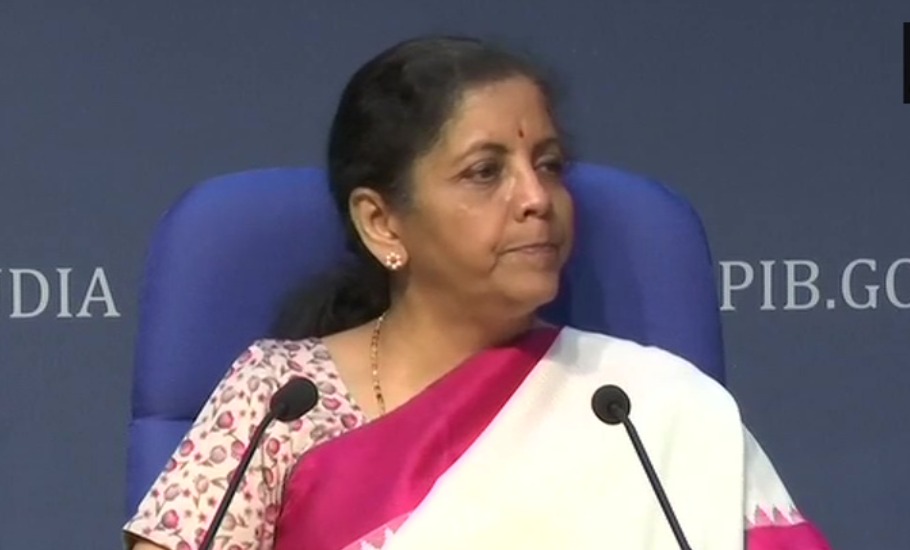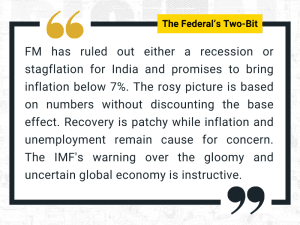
Inflation biting you? The Modinomics solution is stout denial
As Opposition complains about inflation, Union ministers tell the Lok Sabha that skyrocketing food grain, consumer goods and fuel prices are actually for the good of the common man

On Monday (August 1), after a fortnight-long stalemate, as the Centre finally conceded to the Opposition’s demand for a debate in the Lok Sabha on the issue of price rise, speakers from the Treasury benches were exulting in a schadenfreude that was all too palpable.
The crux of what they said over the course of an over six-hour long discussion, marred by interruptions and walk-outs by Opposition MPs, was simple — there is no price rise or inflation in the country.
And, if you disagree, you should do so by first accepting that the skyrocketing food grain, consumer goods and fuel prices are for your own good. While you are at it, you must also feel “grateful” to Prime Minister Narendra Modi for keeping the prices of petrol and diesel high because, well, he’s doing so to “protect you” and to provide 80 crore poor Indians “free fund ka khana” (free food as charity).
Spirited arguments
Opposition MPs such as Congress’s Manish Tewari, Jothimani and Adhir Ranjan Chowdhury, NCP’s Supriya Sule, DMK’s K. Kanimozhi, Trinamool Congress’s Kakoli Ghosh Dastidar and Kalyan Banerjee, Nama Nageshwara Rao (TRS) and Pinaki Mishra (BJD) did make spirited arguments to highlight the deep hole that rising prices of practically all essential commodities was burning in the pockets of ordinary citizens.

But speakers from the Treasury benches — among them BJP MP Nishikant Dubey, former Union minister of state for finance Jayant Sinha and finally finance minister Nirmala Sitharaman — remained resolutely in denial.
So while you, dear reader, may be feeling the pinch of consistently doling out anything between Rs 85 and Rs 115 for a litre of petrol and diesel or for your steadily and steeply rising grocery bills, the worthies from the ruling coalition would have you believe that paying higher and higher amounts for practically anything — even withdrawing your own money from your bank/ATM accounts — is, ultimately, your bounden duty to your country.
The pearls of wisdom proffered by members of the Treasury benches need to be reproduced to explain afresh why the nation owes a debt of gratitude to the Prime Minister and his government for the honour of shelling out those extra — and often unavailable — rupees. Fair warning though — much of these gems aren’t for the faint hearted and reader discretion is advised.
Also read: Spiralling petrol price rises add to woes of delivery agents; many quit
Pay without complaining: Dubey
Let’s start with Nishikant Dubey. The BJP’s MP from Jharkhand’s Godda was the first speaker from the government’s side and his erudition in explaining why India must pay more — and without complaining — would have, perhaps, made even Sitharaman, if not Modi himself, blush. Of the many areas that Dubey touched in his submission, at least two stood out for their sheer audacity.
First, the Godda MP claimed that unlike the UPA years when nearly every session of Parliament would have a mention of farmer suicides, the issue hadn’t come up for discussion even once in the past eight years of the Modi government. This, Dubey explained, was for two reasons — “farmers had stopped committing suicide” and “Modiji had empowered farmers so much since 2014 that they could now sustain a year-long protest against the Modi government without any of them committing suicide”.
Of course, what Dubey forgot to mention was that as per official data, as many as 17,299 farmers had died by suicide across the country between 2018 and 2020 while the 15-month long peasant protests against the Modi government’s three farm laws had also claimed close to 100 lives.
Next, Dubey also claimed that the pandemic years and then the Ukraine-Russia war had led to a global decline in production of wheat, rice and sugar but “our Prime Minister was still giving free fund ka khana to 80 crore Indians” for which Modi should be shown gratitude and be congratulated.
Again, what escaped Dubey was the fact that India, at least for now, remains a welfare state and it is the obligation of the government to provide for its people and the “free fund ka khana” wasn’t being billed to the personal account of the Prime Minister but being paid for by the monies the government makes from its ever increasing direct and indirect taxes.
No price rise: Jayant Sinha
If Dubey wanted Indians reeling under price rise to feel indebted to the Prime Minister and the central government for being given the privilege of paying more, his party colleague and former junior minister for finance, Jayant Sinha went a step ahead to claim, “mehangai hai hi nahi (there is no price rise)”.
Also read: Bommai lists dosa rates of Bengaluru hotel to counter price rise claims
Perhaps Sinha hasn’t been speaking to his father — former Union finance minister Yashwant Sinha — lately. While the senior Sinha has repeatedly spoken against rising inflation, growing joblessness and the mess that the Modi regime has made of the Indian economy, his son believes, “Indians today feel secure… they don’t worry about price rise because they feel secure under Prime Minister Narendra Modi”.
If the submissions by Dubey, Sinha or other BJP speakers had still left some nagging doubts among Indians over the Opposition’s inflation bogey, these were addressed by finance minister Nirmala Sitharaman. In an over one-hour-long reply that she herself conceded was “partly political” (only because the Opposition’s charge of price rise, according to her, was driven by politics and not statistics), the finance minister waxed eloquent about the success story of India’s economy — how it had managed to remain the fastest growing economy in the world despite the double whammy of a raging COVID pandemic and Ukraine-Russia war that had left a majority of global economies crippled.
FM vs the rest
Sitharaman’s response, in a nutshell, to every charge levelled by the Opposition was pretty straight forward — the Opposition was wrong, she and her government were right. If the Opposition said prices of essential commodities — food grain, milk and other dairy products, life-saving drugs — had risen astronomically, Sitharaman said they hadn’t, or at least, not as much as they had risen during the UPA-II years.
If the Opposition MPs claimed decisions taken at the GST council to hike GST rates weren’t unanimous, Sitharaman countered with “they were”. If the Opposition protested against the 5 percent GST levied on packaged milk, curd, rice and other staples, Sitharaman’s response was “buy it loose; unpackaged, unbranded” (somewhat reminiscent of her cavalier dismissal of the problem posed by rising onion prices some years ago when she told Parliament that she didn’t eat onions).
If the Opposition said prices of petrol, diesel and LPG cylinders were at an all-time high, Sitharaman disagreed. She argued that, in actual terms, these prices were still lower than the UPA era even if the people were actually paying more because the UPA-era rates were subsidised while the current rates are helping the government build its coffers so that it can reinvest the money towards developmental expenditure and help the citizens.
Also read: Are previous govts to blame for rise in petrol prices – as Modi said?
And then, of course, there was that riposte of the high fuel prices being a consequence of the UPA-era oil bonds — an argument that has been viral on WhatsApp groups for months now. It, obviously, mattered little to Sitharaman that several Opposition speakers had explained why the oil bonds argument was fallacious.
The BJD’s Pinaki Mishra had said in his submission during the debate, “a familiar argument which everybody from the Government Benches trots out… we are victim today of the oil bonds that the UPA Government floated and these fuel prices are a result of that and, therefore, we have to keep increasing the fuel prices.” Mishra had added, “Let me give you some actual figures.
The actual figures are that from 2014 to 2022, Rs. 27,27,000 crore has been generated by way of oil revenues… both, interest and principal, taken together, between 2014 and 2022, which has been repaid by way of oil bonds, is only Rs. 93,600 crore. So, if we take Rs. 27,00,000 crore and Rs. 93,000 crore, the total payment made towards oil bonds from the revenue collected is 3.4 per cent.” Clearly, the finance minister knows better and so, she assiduously rejected Mishra’s charge of “lazy taxation”.
As the debate in the Lok Sabha ended, it was evident that those in government had convinced themselves that the only way of confronting the crisis of inflation was to deny its very existence. Now, if only this was an option also available to the common Indian who actually has to pay for fuel, groceries, medicines, et al.

